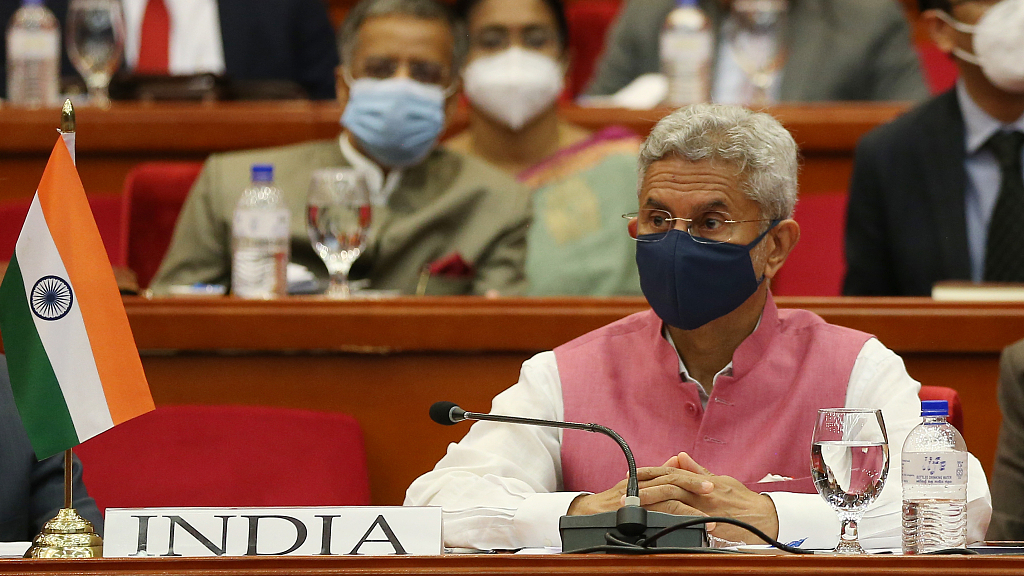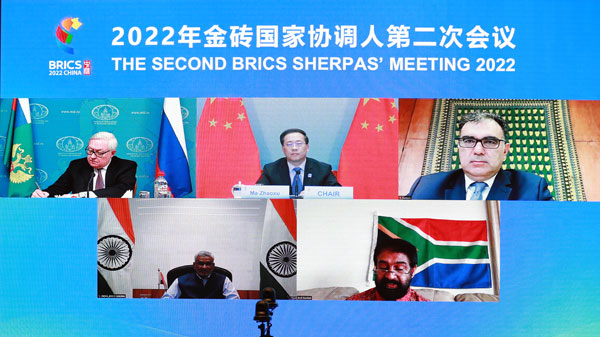
India's Foreign Minister Subrahmanyam Jaishankar attends the Bay of Bengal Initiative for Multi-Sectoral Technical and Economic Cooperation (BIMSTEC) summit in Colombo, Sri Lanka, March 29, 2022. /VCG
India's Foreign Minister Subrahmanyam Jaishankar attends the Bay of Bengal Initiative for Multi-Sectoral Technical and Economic Cooperation (BIMSTEC) summit in Colombo, Sri Lanka, March 29, 2022. /VCG
Editor's note: Rabi Sankar Bosu is an Indian contributor to Chinese media outlets. He writes about Chinese politics, social and cultural issues, and China-India relations with a special interest in the Belt and Road Initiative. The article reflects the author's views, and not necessarily those of CGTN.
The signing of the agreement between India and Sri Lanka to set up hybrid power projects in three islands off the Jaffna coast, located hardly 50 km from India's southern Tamil Nadu state on March 29 had captured much attention from the global media and Indian media outlets. This deal is seen as "a strategic victory for India in its competition with China for influence in the Indian Ocean" as noted by the U.S.-based Associated Press in a demeaning manner. Notably, the power projects were awarded for $12 million to a Chinese venture, Sinosar-Etechwin, in 2019.
However, such type of media-planted fascinating stories on Sino-India ties and Sino-Sri Lanka ties by Western media outlets as well as certain sections of Indian media is a clear attempt "to drive a wedge between China and India." It will create a negative perception of the relationship between the two great neighboring countries - India and China - at a time when the two countries are engaged in mending their ties, leaving behind the memories of the 2020 Galwan Valley clash. More importantly, it is unwise to judge China's relationship with Sri Lanka in the context of India's relationship with China.
The use of the phrase "a strategic victory for India" does not reflect the real scenario of India and China's role in Sri Lanka at all. It is a prejudiced thinking that Sri Lankan economic catastrophe has offered an opportunity for India to strengthen its friendship with Sri Lanka and to dominate the Indian Ocean region. India and China, both are Sri Lanka's good friends and close neighbors. Both are Sri Lanka's development partners. The U.S.-led Western world may be reminded that despite different circumstances and differing geopolitical realities in the two countries, both India and China stand by their closest ally Sri Lanka in the fight against COVID-19 pandemic as well as terrible economic crisis and acute shortages of essential commodities in the island nation.
It should be noted here that as a true neighborhood friend, China has extended support to Sri Lanka's fight against COVID-19. In addition to donating medical equipment, China has gifted three million doses of Sinopharm vaccines, and another 23 million doses were provided at very low, concessionary rates, as Sri Lankan ambassador to China, Palitha Kohona told in an interview with Daily Mirror on January 7.
On the other hand, India, driven by its "neighborhood first" policy, began providing COVID-19 vaccines to its immediate neighbors under its "Vaccine Maitri" initiative in January 2021. India either sold or granted a total of 12.64 million doses to Sri Lanka as of April 13.

Coordinator of China's BRICS Affairs and Vice Foreign Minister Ma Zhaoxu (C) chaired the Second BRICS Sherpas' Meeting 2022, from April 12 to 13, 2022. /Chinese Foreign Ministry
Coordinator of China's BRICS Affairs and Vice Foreign Minister Ma Zhaoxu (C) chaired the Second BRICS Sherpas' Meeting 2022, from April 12 to 13, 2022. /Chinese Foreign Ministry
As Sri Lanka is currently facing its worst economic recession in history with acute shortages of essential commodities leading to nationwide spontaneous protests with the call for "Gota Go Home," both India and China have extended support to Sri Lanka's economic recovery and development.
In the past three months India offered about $2.5 billion to help shore up the sinking economy of the island nation. On the other hand, China has been doing its best to help Sri Lanka as much as possible for its rapid post-COVID economic recovery. China approved a swap arrangement amounting to 10 billion yuan (about $1.57 billion) in addition to the $2.8 billion assistance that China extended to Sri Lanka since the outbreak of the pandemic.
In 2009, Sri Lanka, with the strong assistance from the international community, ended a 30-year-long civil war against the Liberation Tigers of Tamil Eelam (LTTE). The Chinese government and the Chinese people have continued to provide a large number of concessional low interest rate loans and investments for Sri Lanka's post-war reconstruction. While the West and India are still debating the growing Chinese footprints in the island, the fact is that China is taking the lead in maritime, aviation, trade, tourism and cultural cooperation in Sri Lanka under the Belt and Road Initiative.
On the other hand, the Ukraine-Russia conflict has opened up a new horizon for India and China to build a united front against the United States, which is merely using Ukraine as a pawn against Russia. So far, both India and China abstained on Ukraine-related resolutions at the UN Security Council and Human Rights Council. On March 21, U.S. President Joe Biden sneered at India for its "shaky" response to the Russian offensive and threatened to impose sanctions on India under the Countering America's Adversaries through Sanctions Act (CAATSA). However, during his virtual meeting with President Biden on April 11, Prime Minister Modi explained New Delhi's "neutral stance" on the Ukraine conflict and made it clear that India has no intention to hurt Russia ties.
It is an opportune time, therefore, for the two close neighbors to speak out in one voice against the U.S. for its failure to assume due responsibility, including how the U.S.-backed NATO alliance in Europe ignored Russia's security concerns as well. The U.S. and its Western allies are in no position to lecture India and China about their national interests or their relationship with any member of nations in the international arena - be it Russia or Sri Lanka.
During his visit to India on March 25, the Chinese foreign minister said that the two sides should not allow the border dispute to define their relationship or to affect the overall development of bilateral ties. It is hoped that in the current geopolitical situation, China and India, as two important regional powers and emerging economies as well as members of BRICS, SCO and G20, will steer bilateral cooperation to bring real benefits to the two countries and peoples. The two neighboring countries will support each other's participation in the regional cooperation process, and jointly promote peace, stability, and development in the world.
(If you want to contribute and have specific expertise, please contact us at opinions@cgtn.com. Follow @thouse_opinions on Twitter to discover the latest commentaries in the CGTN Opinion Section.)

